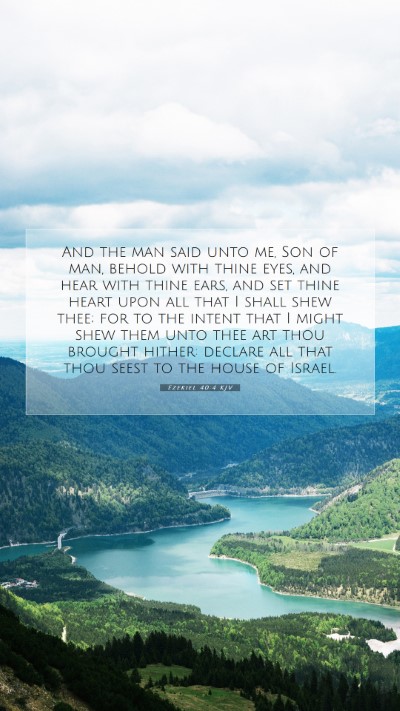Ezekiel 40:4 - Bible Verse Commentary and Interpretation
Ezekiel 40:4 states: "And the man said unto me, Son of man, behold with thine eyes, and hear with thine ears, and set thine heart upon all that I shall show thee; for to the intent that I might show them unto thee art thou brought hither: declare all that thou seest to the house of Israel."
This verse acts as an introduction to a detailed vision that God gives to Ezekiel, preparing him for what he is about to witness regarding the future temple and worship practices of Israel.
Meaning and Understanding of the Verse
The verse is rich in meaning and has been interpreted through various commentaries. Here are combined insights from notable public domain commentaries such as those of Matthew Henry, Albert Barnes, and Adam Clarke:
-
Preparation for Revelation:
The command to "behold," "hear," and "set thine heart" implies a deep engagement is necessary from Ezekiel. This signifies that understanding divine revelation requires focused attention and a receptive spirit. It serves as a reminder for all readers about the importance of being attentive to God's Word.
-
Significance of the Vision:
Ezekiel is drawn to experience a vision that is crucial for the people of Israel. The phrase "declare all that thou seest" emphasizes the responsibility placed upon Ezekiel to communicate God's plans and judgments to the community, highlighting the role of the prophet as a messenger.
-
The Role of the Prophet:
Ezekiel’s designation as "Son of man" not only reveals his humanity but also underscores God's authority over him. Prophets often had a dual role: they delivery dire warnings while also imparting hope for the future—a theme that recurs throughout Biblical prophecy.
-
Call to Action:
The instructions given to Ezekiel also reflect a broader call to action for all believers. It serves as a reminder that we are to actively engage in Scripture and share its truths with others for their edification.
-
Contextual Background:
Understanding the historical background is critical. This vision occurs during the Babylonian exile, a time when the Israelites needed hope and direction. Ezekiel’s prophetic mission is aimed at restoration, pointing towards the future temple, which symbolizes God's dwelling among His people.
Bible Verse Meanings: Broader Implications
The insights from Ezekiel 40:4 are not limited to the immediate context but extend to broader themes in Scripture. Here are some significant implications:
-
The Nature of Divine Revelation:
The unfolding of God's plans is often gradual and requires our active engagement. This is especially true in Bible study, where we seek to understand difficult Bible passages and apply their meanings to our lives.
-
The Importance of Prophecy:
Prophecies in the Bible serve as spiritual guides and warnings. Ezekiel acts as an essential figure who outlines God's future intentions, reminding us of the prophetic element found throughout Scripture.
-
Application in Daily Life:
The exhortation to be observant can guide our interactions with the world around us. The engagement with divine truths can encourage deeper faith and understanding as we learning to interpret Bible verses in the context of everyday experiences.
Cross References
Ezekiel 40:4 can be cross-referenced with the following Scripture passages for deeper contextual understanding:
- Ezekiel 1:1-3: Ezekiel's initial calling and prophetic mission.
- Revelation 1:3: A similar emphasis on listening to the messages intended for God's people.
- Hebrews 1:1-2: God's revelation through prophets and His Son further establishing the role of prophetic authority.
Conclusion
In studying Ezekiel 40:4, we find profound insights into the nature of divine communication, prophetic responsibility, and the call to attentive engagement with God's messages. This verse not only enriches our understanding of the prophetic tradition but also encourages us to actively participate in the unfolding story of redemption through thorough Bible study and prayerful contemplation.


